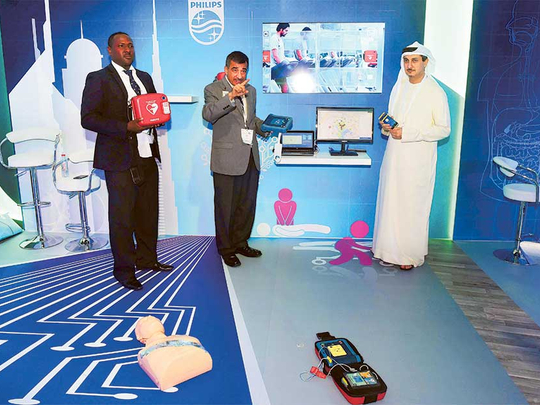
Dubai: Death due to a Sudden Cardiac Arrest (SCA) may soon be avoidable in Dubai as Dubai Health Authority (DHA) launched the Dubai Heart Safest City Project by 2020 to be able to save 65 per cent lives of those suffering cardiac arrest.
By 2020, Dubai will join the rank of two other cities to be one of the safest cities in the world for saving lives during an SCA incident, officials of Dubai Health Authority (DHA) revealed on the sidelines of the concluding day of the Dubai Health Forum. At present, health care officials are working towards creating a dedicated fast response infrastructure to be able to achieve this goal
An SCA occurs when an individual’s heart unexpectedly stops beating. If this happens, blood stops flowing to the brain and other vital organs. The SCA usually causes death if it’s not treated within minutes.
Dr Moin Fikree, medical director of Rashid Hospital Trauma Care Centre explained: “So far, the survival rate for anyone undergoing SCA is between 5-10 per cent worldwide except in the cities of Copenhagen and Seattle where the survival rate is 62 per cent. We are going to adapt the same app created by Philips and are building a fast response system around it as the window to save a life after a sudden cardiac arrest is very small.”
Currently, there are about 30,000 people trained in administering Cardio Pulmonary Resuscitation (CPR) and about 1,500 defibrillators deployed in important public places. The DHA is in the process of training about a 100,000 to 150,000 people in CPR and working towards deploying 10,000 defibrillators in all significant public places. A defibrilator is a compact device that administers an electric current and stretches survival time for the patient.
Explaining how the integrated system will work along with the app, which is currently being used n Copenhagen and Seattle, and will be adapted for use in Dubai, Dr Fahad Baslaib, head of cardiology at Rashid Hospital, said: “People will be able to download the bilingual app in Arabic and English which will have independent operating systems. So if any individual witnesses another person collapsing suddenly on the ground, all he or she needs to do is click on the app to activate it. Immediately, it will notify the closest person with CPR training who will already be registered with us and will also show the closest defibrillator to the incident. At the same time, the Dubai Police, Ambulance and the Emergency Room will be notified. Once the CPR is administered and defibrillator deployed, the paramedics in the ambulance will rush to the rescue, conduct an ECG and immediately transmit to the ER room at the hospital which will prepare to receive the patient and also know in advance if the patient will need emergency surgery.”
Dr Baslaib said while Copenhagen and Seattle saved 62 per cent lives in such episodes, Dubai was working towards tweaking the fast response system to be able to save up to 65 per cent lives.
Dr Baslaib added such an integrated system was already in place for heart attacks. “We encourage heart patients to go on the Dubai Police website and register themselves on the heart attack section. The moment a patient calls from the registered number on 999, the police is able to recognise that the number is of a cardiac patient and the ambulance and ER are activated.












